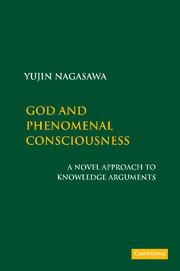Book contents
- Frontmatter
- Contents
- Preface
- PART I THE STRUCTURE OF KNOWLEDGE ARGUMENTS
- PART II KNOWLEDGE ARGUMENTS IN THE PHILOSOPHY OF RELIGION
- PART III KNOWLEDGE ARGUMENTS IN THE PHILOSOPHY OF MIND
- 5 Nagel's Bat Argument
- 6 Jackson's Mary Argument (1)
- 7 Jackson's Mary Argument (2)
- PART IV KNOWLEDGE ARGUMENTS AND NONTHEORETICAL PHYSICALISM
- References
- Index
7 - Jackson's Mary Argument (2)
Published online by Cambridge University Press: 23 July 2009
- Frontmatter
- Contents
- Preface
- PART I THE STRUCTURE OF KNOWLEDGE ARGUMENTS
- PART II KNOWLEDGE ARGUMENTS IN THE PHILOSOPHY OF RELIGION
- PART III KNOWLEDGE ARGUMENTS IN THE PHILOSOPHY OF MIND
- 5 Nagel's Bat Argument
- 6 Jackson's Mary Argument (1)
- 7 Jackson's Mary Argument (2)
- PART IV KNOWLEDGE ARGUMENTS AND NONTHEORETICAL PHYSICALISM
- References
- Index
Summary
INTRODUCTION
In Chapter 6 I argued, using the concepts of physical omniscience and dualistic omniscience, that Frank Jackson's Mary argument was not necessarily good news for dualists, because if it were successful in undermining physicalism, it would be equally successful in undermining at least a certain form of dualism. I did not consider, however, whether or not the Mary argument was in fact successful. Hence, the aim of this chapter is to examine the cogency of the argument.
In Chapter 5, I provided a new objection to Thomas Nagel's bat argument by comparing it with Patrick Grim's argument from knowledge de se, which I discussed in Chapter 2. Similarly, in this chapter, I provide a new objection to Jackson's Mary argument by comparing it with the argument from concept possession, which I discussed in Chapters 3 and 4. However, the way I formulate an objection to the Mary argument in this chapter is slightly different. While in Chapter 5 I formulated the objection to the bat argument by appealing to its overall similarity with the argument from knowledge de se, in this chapter I formulate a new objection to the Mary argument by appealing to its crucial dissimilarity with the argument from concept possession.
As I have noted, Jackson's Mary argument represents one of the most famous and provocative thought experiments in the philosophy of mind.
- Type
- Chapter
- Information
- God and Phenomenal ConsciousnessA Novel Approach to Knowledge Arguments, pp. 115 - 132Publisher: Cambridge University PressPrint publication year: 2008



